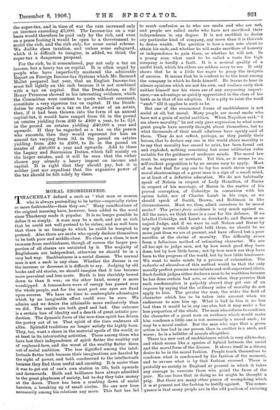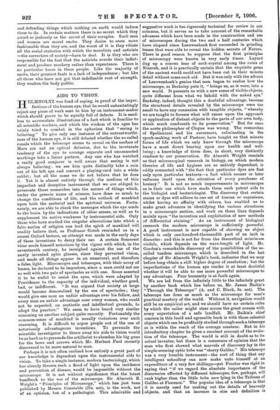MORAL SNOBBISHNESS. T FIACKERAY defined a snob as "that man or
woman who is always pretending to be better—especially richer or more fashionable—than they are." Many ramifications of the original meaning have, however, been added to the word since Thackeray made it popular. It is no longer possible to define it so simply. A man may be a snob, and yet so rich that he could not well pretend to be richer, and so well born that there is no lineage to which he could be tempted to pretend. Also there are snobs who openly declare themselves to be both poor and middle-class. No class, as a class, is now immune from snobbishness, though of course the larger pro- portion of aU classes are untainted by it. The majority of Englishmen are independent, otherwise we should be in a very bad way. Snobbishness is a social disease. The normal man is not a snob in any class. Whether the disease is on the increase or decrease it is difficult to say. Judging by old books and old stories, we should imagine that it has become more prevalent and less acute. Birth is less slavishly bowed down to than it was; on the other hand, money is more worshipped. A tremendous wave of energy has passed over the whole people, and for the most part our eyes are fixed upon success. •We have no time to contemplate advantages which by no imaginable effort could ever be ours. We admire and we desire the attainable more exclusively than we did. The results are both good and bad. One outcome is a certain loss of ideality and a dearth of great artistic pro- duction. The dynamic force of the new-time spirit has driven the poetry out of us. That spirit of the time embraces all alike. Splendid traditions no longer satisfy the highly born. They, too, want a share in the material spoils of the world, or at least in its intoxicating activities. Those among them who have lost their independence of spirit flatter the wealthy out of cupboard-love, and the worst of the wealthy flatter them out of social ambition. The less dignified among the intel- lectuals flatter both because their imaginations are dazzled by the sight of power, and both condescend to the intellectuals because they find them useful and amusing. It is easier than it was to get out of one's own station in life, both upwards and downwards. Birth and brilliance have always admitted to the great playhouse of society, but to-day they take money at the doors. There has been a crashing down of social barriers, a breaking up of small circles. No one now lives necessarily among his relations any more. This fact has led
to much confusion as to who are snobs and who are not and people are called snobs who have not sacrificed their independence in any degree. It is not snobbish to desire any particular kind of company, any more than it is thievish to desire wealth. The question is how a man sets about to
attain his ends, and whether be will make sacrifices of honesty or independence to gain them, or whether be will not. In a young man what used to be called a taste for high company is hardly a fault. It is a neutral quality of a useful kind, which his elders are seldom sorry to see. It only shows that he is a little too eager to grasp the insignia of success. It means that be is content to be the least among the company in which he finds himself. He learns to hear in silence opinions which are not his own, and realises early that neither himself nor his views are of any surpassing import- ance,—an advantage as quickly appreciated in the class of his birth as in that of his adoption. It is a pity to raise the word " snob " till it applies to such as he.
But one of the commonest forms of snobbishness is not social at all, but moral. Many people are moral snobs who have not a grain of social ambition. When Napoleon said, " I am above morality," he not only gave expression to what some great people have secretly thought about themselves, but to what thousands of their small admirers have openly said of them. They do not reflect, perhaps, as they justify their heroes, that to declare any one in the world above morality is to say that morality has ceased to exist, has been found out and exploded, nothing remaining but some utilitarian rules suitable for the guidance of mediocre minds. The moral law must be supreme or nowhere. Yet this, as it seems to us, self-evident proposition is by no means easy to apply. Most of us feel that for any one to lay too much stress upon the moral shortcomings of a great man is a sign of a small mind, or at least of a defective education. We do not habitually speak of Nelson in respect of Lady Hamilton, of Burns in respect of his marriage, of Bacon in the matter of his proved corruption, of Coleridge in connexion with his opium habit, nor of Charles Lamb in his cups, as we should speak of Smith, Brown, and Robinson in like circumstances. Must we, then, admit ourselves to be moral snobs ? The primd-facie evidence is very much against us. All the same, we think there is a case for the defence. If we labelled Coleridge and Lamb as drunkards, and Bacon as an unjust Judge, and if we were to call Nelson and Burns by any ugly names which might befit them, we should be no more just than we are at present, and have offered but a poor sacrifice at the shrine of morality. The difficulty arises from a fallacious method of estimating character. We are all too apt to judge men, not by how much good they have done, but by how little harm; not by bow much use they have been to the progress of the world, but by how little hindrance. We want to make saints by a process of exhaustion. The reductio ad absurdum of this method would be that the only morally perfect persons were infants and well-supervised idiots. Such foolish judges either declare a man to be worthless because be has done certain bad acts, or else when they perceive that such condemnation is palpably absurd they get out of an impasse by saying that the ordinary rules of morality do not apply to him. The greater the man, the wider the field of character which has to be taken into account when we endeavour to sum him up. What is bad in him is no less bad than it would be in any one else, but it may make a far less proportion of the whole. The man who refuses to condemn the character of a great man on evidence which would make him condemn a little one is not necessarily a moral snob ; he may be a moral realist. But the man who says that a given action is less bad in one person than in another is a snob, and worse ; he is a belittler of morals altogether.
There is a new sort of snobbishness which is very rife to-day, and which seems like a species of hybrid between the social and the moral form of the disease. It shows itself in a strong desire to be in the moral fashion. People teach themselves to condemn what is condemned by the fashion of the moment, and to excuse what is by that fashion excused. There is probably no society in England at present in which it takes any courage to execrate those who grind the faces of the poor. No one fears that in doing so he might be thought a prig. But there are many other pieces of wrongdoing which it is at present not the fashion to testify against. The conse- quence is that many people are in the odd position of excusing and defending things which nothing on earth would induce them to do. In certain matters there is no secret which they guard so jealously as the secret of their scruples. Such men and women are moral snobs. They desire to seem more fashionable than they are, and the worst of it is they vitiate all the social statistics with which the moralists and satirists —the correctors of society—have to deal. It ip they who are responsible for the fact that the satirists overdo their indict- ment and produce mockery rather than repentance. There is no particular harm in these people. Like the majority of snobs, their greatest fault is a lack of independence ; but like all those who have not got that indefinable root of strength, they weaken the body politic.



























































 Previous page
Previous page